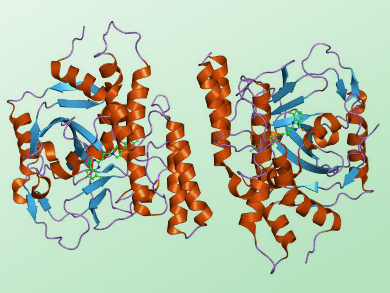One of the hallmarks of cancer is the evasion of apoptosis, the programmed death of diseased cells. This process is controlled by DNA damage response (DDR) systems, which are vital for maintaining the genetic integrity of cells. They are disrupted in cancer cells. Drugs targeting DDR genes are increasingly attracting attention, since an inhibitor of poly (ADP-ribose) polymerase (PARP, pictured) called olaparib has recently been licensed for the treatment of ovarian cancer. A new analytical study now reveals a range of other potential targets for cancer treatment within the DDR network.
In a large-scale bioinformatic approach, a team of researchers led by Frances Pearl, University of Sussex, UK, and Bissan Al-Lazikani, The Institue of Cancer Research (ICR), London, UK, analyzed the mutation patterns of 450 DDR genes in tumours from 5,000 patients. Using prediction methods and detailed analysis of DDR pathways, they identified possible targets for precision drugs. This analysis uncovers promising potential targets for new cancer treatments.
The development of precision medicine based on these findings may help avoid the side effects of chemotherapy, a treatment that kills not only cancer cells, but commonly also affects healthy cells.
- Therapeutic opportunities within the DNA damage response,
Laurence H. Pearl, Amanda C. Schierz, Simon E. Ward, Bissan Al-Lazikani, Frances M. G. Pearl,
Nat. Rev. Cancer 2015, 15, 166–180.
DOI: 10.1038/nrc3891




